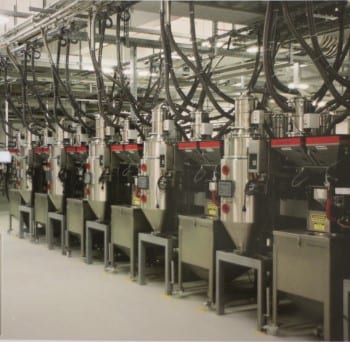Recycled plastic is not only good for the environment; it costs less – reducing plastic production costs.
So if the production costs are lower, why are there such low rates of recycled plastics? According to OECD’s 2018 Environment Policy Paper (No. 12), recycled plastics represents just 12 percent of total global plastics production.
To understand the dynamics, let’s take a look at some of the advantages and challenges of recycled plastics and see what is preventing companies from using them.
The biggest factor driving the increase in recycled plastics within the production processes is the establishment of new regulations that mandate their use. The EU, US, and other countries have mandated an increase in the use of recycled plastics.
Their environmental argument is clear: Recycling plastics reduces the amount of energy and resources needed to create plastic, including water, petroleum, natural gas, and coal, and it keeps plastics out of landfills.
But for most manufacturers, the most significant reason to use recycled plastics is that it costs less than virgin materials – bringing down the cost of production.
The problem facing manufacturers is that recycled plastic combined with virgin plastic can complicate the production process.
The issue is that the amount of recycled plastic used in a product is not constant; it depends on several different factors including the grade (i.e., the quality) of the plastic, the type of product being produced, how important quality is for that particular product, and the type of customer.
As a result, when recycled plastic enters the system, recipes need to be adapted to integrate the recycled material effectively.
For manufacturers working with local batch blending systems rather than centralized batch blending systems, this is a significant challenge that requires adjusting the recipes for each of the systems in the factory.
Local batch blending systems generally are limited in terms of how many types of raw material can be used. This creates challenges when working with recycled plastics.
Some recycled plastics are of a higher grade and some are of a lower grade – and the lower grade plastics are less expensive. Therefore, sometimes it may be beneficial to create a mixture that includes several recycled materials of different grades. However, this frequently is not an option supported by the machinery due to the limited number of raw material options supported by local batch blending systems.
In addition, local batch blending systems require the same recipe used for all production machines serviced by each of the blending systems. It’s not possible to define different recipes for the different products.

LIAD’s centralized blending systems are unique, offering a solution that eliminates many of the manufacturing challenges when working with recycled plastics.
Changes to recipes are done more easily. In a centralized blending system, there are a larger number of raw materials. It’s easy to change the recipe and integrate different recycled plastics, as there’s no need to empty out each machine and refill it – providing manufacturers large time savings. As soon as the Quality Assurance team approves a certain percentage of a grade of recycled plastic, the recipe is easily adapted.
LIAD’s centralized systems also have the advantage of being able to handle a greater number of raw materials. This is significant in using recycled plastics as recipe cost is lowered by combining different grades of recycled plastics.
The centralized systems further eliminates the possibility of using the wrong materials in a particular product. People makes mistakes, and sometimes use the wrong raw materials. With LIAD’s centralized blending systems, there’s no need to empty out each machine and refill it, and this avoids the possibility of human error.
The centralized batch blending systems require fewer workers to run them, so a factory using a centralized system benefits from a reduced staff.
The systems also save floor space in the factory. A single centralized system takes up only 16 square meters of space and supports up to 50 processing machines. There’s no need for additional machines spread out throughout the factory.
Another money saver is a reduction in the number of loaders and the size of the vacuum system. With local batch blending systems, much more pipe is necessary – as the raw materials need to be routed separately to each batch blending system.
LIAD offers several solutions for centralized blending systems, including PelletSave – a modular system of central batch blending that uses sequential weighing, with a single weighing hopper and central mixing.
The system has a central mechanical dosing structure that provides highly accurate blending ratios. Combined with innovative control software, PelletSave allows to prepare batches for each of the plant’s processing machines.
An alternative centralized blending system is BlendSave – an advanced, multi-channel batch system that uses a separate weighing hopper to weigh each material in tandem and prepare accurate batches. The mixing is done separately on each machine.
BlendSave has up to fourteen individual weighing hoppers – and several BlendSave systems can be interconnected and used together. For example, with three BlendSave systems, there are forty-two channels.
BlendSave is patented in the U.S. and other countries, and is in the process of receiving patents in additional countries around the world.

Centralized blending systems offer greater flexibility and efficiency that eliminate many of the problems that come up, when integrated recycled plastics in production.
Using LIAD’s innovative solutions for centralized batch blending, manufacturers can make better use of recycled plastics – thereby cutting down on production costs, and improving the bottom line. For more information, be in touch with us today at: prod@liadsmart.com
Speak directly with our engineers and find ways to reduce cost, inventory and time
Request a Demo© Copyright Ampacet Corporation. All Rights Reserved